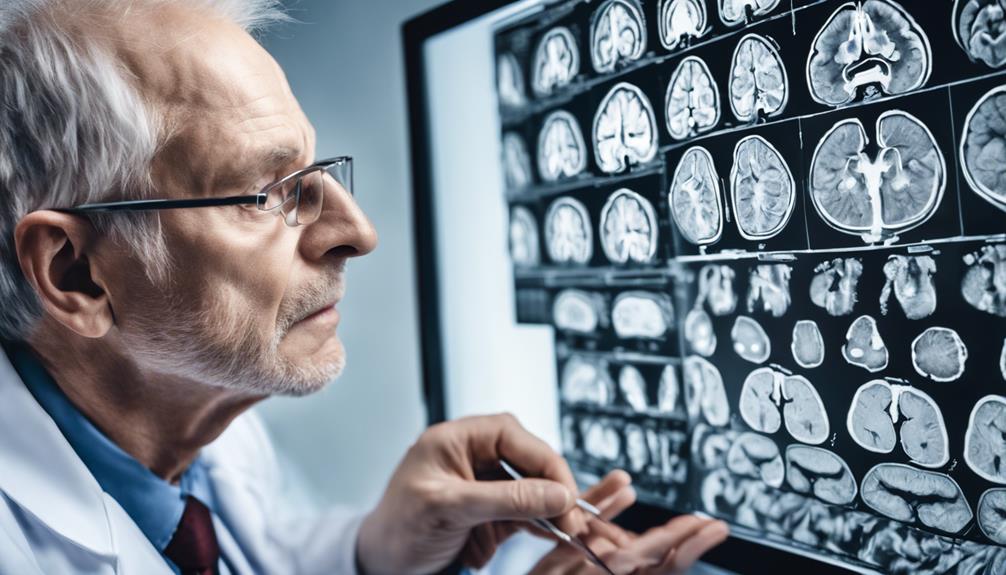Proper diagnosis is essential for effective dementia treatment. It is crucial for creating individualized treatment plans and pinpointing specific symptoms. Early diagnosis allows for timely assistance and clarification of conditions. Different forms of dementia necessitate varying approaches. Tailored care plans enhance quality of life through cognitive activities, therapies, exercises, and emotional support. Precise diagnosis permits the implementation of targeted treatment strategies, such as medications and therapies. Customized interventions can optimize outcomes. Utilizing support services like memory clinics and caregiver assistance enhances care. Understanding the different types of dementia is crucial. Managing medications and exploring therapy options can further improve the quality of life for patients. Learn more about this critical subject for effective dementia management.
Key Takeaways
- Accurate diagnosis crucial for tailored treatment plans and appropriate medical management.
- Early diagnosis allows timely access to support, clarifying conditions, and treatment planning benefits.
- Proper diagnosis leads to personalized interventions, optimizing quality of life for dementia patients.
- Correct diagnosis enables access to essential support services and enhances care strategies.
- Understanding different forms of dementia is key for choosing the right interventions and treatment options.
Significance of Accurate Dementia Diagnosis
Accurate diagnosis of dementia is essential for tailoring effective treatment plans and providing targeted care. Vital diagnosis plays a critical role in identifying the specific type of dementia a person may have, such as Alzheimer's disease, vascular dementia, or Lewy body dementia. Different types of dementia may present with varying symptoms, and an accurate diagnosis helps in understanding these symptoms and providing appropriate medical management.
Symptoms of dementia can include memory loss, difficulty with language or communication, changes in mood or behavior, and challenges with daily tasks.
With the right diagnosis, individuals with dementia can access support services that are tailored to their specific condition. This includes therapies, resources, and programs designed to improve their quality of life and slow the progression of the disease. Timely and precise diagnosis not only allows for the best use of available treatments but also aids in planning for the future and ensuring that individuals receive the care and assistance they need.
Tailored Treatment Plans for Dementia

Understanding the individual's specific symptoms, needs, and preferences is key in developing tailored treatment plans for dementia. These plans take into account various factors such as the type and stage of dementia, coexisting medical conditions, and the individual's preferences to provide best care.
Here are four essential aspects to take into account when creating tailored treatment plans for dementia:
- Personalized Approaches: Tailored treatment plans involve personalized approaches that cater to the unique needs and symptoms of each individual with dementia.
- Comprehensive Care: Effective treatment plans may include a combination of medications, therapies, lifestyle modifications, and support services to address the diverse needs of individuals with dementia.
- Regular Evaluations: Regular evaluations and adjustments to the treatment plan are essential to make sure that changing needs are addressed promptly and that the plan is optimized for the best outcomes.
- Collaborative Efforts: Collaborating with a multidisciplinary team, including healthcare professionals, caregivers, and support services, enhances the effectiveness of tailored treatment plans by bringing together diverse expertise and perspectives.
Access to Essential Support Services
Accessing necessary support services is vital for individuals with dementia to receive thorough care tailored to their specific needs. After a dementia diagnosis, various support services become essential for both patients and caregivers. These services encompass a range of assistance, from practical help to emotional support. Below is a table outlining some key support services available for individuals following a dementia diagnosis:
| Support Services | Description | Benefits |
|---|---|---|
| Memory Clinics | Specialized clinics for dementia patients | Provide comprehensive assessment and care |
| Caregiver Assistance | Support for those caring for dementia patients | Offers guidance, respite, and emotional support |
| Respite Care | Temporary care for patients, allowing caregivers a break | Prevents caregiver burnout and ensures patient safety |
| Counseling | Emotional support and guidance | Helps individuals cope with the challenges of dementia |
These services play a critical role in enhancing the quality of life for individuals with dementia and their caregivers. Access to such support services guarantees a well-rounded approach to dementia care, addressing both practical and emotional needs effectively.
Personalized Interventions for Dementia Care

When caring for someone with dementia, it's important to personalize their treatment plan to meet their specific needs. By tailoring care plans and therapy options, we can better support their overall well-being.
Considering factors like the type of dementia, medical history, and lifestyle helps in creating effective interventions.
Tailored Care Plans
Tailored care plans in dementia treatment involve customizing interventions based on an individual's specific symptoms, needs, and preferences to optimize their quality of life. These personalized interventions are vital in providing the best possible care for those living with dementia. Here are some key aspects of tailored care plans:
- Cognitive Stimulation Activities: Engaging activities designed to stimulate thinking and memory.
- Behavioral Therapies: Strategies to address and manage challenging behaviors.
- Physical Exercises: Tailored to the individual's abilities to promote physical well-being.
- Emotional Support: Providing comfort and reassurance to help individuals cope with the emotional aspects of dementia.
Individualized Therapy Options
Individualized therapy options in dementia care involve tailoring treatments to address each person's specific needs and preferences while maximizing quality of life and overall well-being. Personalized interventions take into account factors such as the type and stage of dementia, overall health, and individual lifestyle.
The primary goal of individualized therapy is to manage symptoms effectively and support overall well-being. These tailored approaches may consist of a combination of medication, cognitive therapies, lifestyle modifications, and support services. By customizing care strategies, individuals with dementia can receive targeted support that addresses their unique challenges and enhances their daily functioning.
It's crucial to contemplate these personalized interventions when providing care for individuals with dementia to secure the best possible outcomes for their well-being and quality of life.
Benefits of Early Dementia Diagnosis

Early dementia diagnosis offers numerous advantages, such as timely access to essential support services and treatments.
It also aids in identifying the specific type of dementia, allowing for personalized care plans.
Early Intervention Advantages
Identifying the signs of dementia early can greatly impact the quality of care and support individuals receive. Here are the advantages of early intervention in dementia diagnosis:
- Timely Access to Support: Early diagnosis allows for prompt access to appropriate support, treatments, and resources for managing symptoms effectively.
- Clarifying Conditions: Seeking medical help early is crucial to differentiate treatable conditions like depression, anxiety, or infections from dementia.
- Understanding Changes: Early intervention helps in comprehending the cognitive decline being experienced and identifies entitlement to benefits and legal protection.
- Access to Resources: Proper diagnosis enables access to support groups, therapies, medications, financial benefits, and legal protection for individuals and their caregivers.
Treatment Planning Benefits
Personalized treatment planning in dementia care is essential for optimizing outcomes and addressing individual needs effectively. Early diagnosis of dementia plays a critical role in developing these tailored plans. Through early identification, individuals gain access to a variety of drug therapies and non-drug therapies that can help manage symptoms and improve cognition. This proactive approach not only enhances the quality of life but also allows for better symptom management and support strategies.
Understanding the specific type of dementia through diagnosis enables healthcare professionals to provide targeted care. Additionally, early diagnosis aids in preparing for the future by making legal, financial, and care arrangements in advance. Embracing early diagnosis benefits not only the individual but also their loved ones by fostering a clear understanding of the challenges ahead.
Improved Quality of Life
Accessing appropriate support, treatments, and resources early in dementia diagnosis greatly enhances the individual's quality of life. Here are four key benefits of early dementia diagnosis:
- Better Planning: Timely diagnosis allows for proper planning, understanding changes, and adjusting to the condition effectively.
- Tailored Therapies: Identifying the type of dementia early enables access to specific therapies and medications customized to the individual's needs.
- Enhanced Support: Early diagnosis helps in explaining challenges to family, friends, and colleagues, fostering better support and understanding.
- Financial and Legal Assistance: Proper diagnosis assists in accessing financial benefits, legal protections, and support services essential for managing the condition efficiently.
Understanding Different Forms of Dementia

When exploring the landscape of dementia, it becomes essential to distinguish between the various forms that manifest with distinct symptoms and progression.
Alzheimer's disease, the most common form, affects older adults with progressive memory loss and cognitive decline.
Frontotemporal dementia, a rare type, primarily impacts younger individuals, leading to changes in behavior, personality, and language skills.
Lewy body dementia is characterized by abnormal protein deposits in the brain, causing symptoms like visual hallucinations, movement issues, and cognitive fluctuations.
Vascular dementia results from damage to blood vessels in the brain, often due to strokes, leading to difficulties with reasoning, judgment, and memory.
Mixed dementia is a combination of different types, making diagnosis and treatment more complex due to overlapping symptoms and causes.
Understanding these various forms is vital for healthcare providers to provide appropriate care and support tailored to the specific needs of individuals with dementia.
Pharmacological and Non-Pharmacological Interventions

When treating dementia, we consider two main types of interventions: pharmacological and non-pharmacological. Pharmacological interventions involve using medications like acetylcholinesterase inhibitors and memantine to help with cognitive function.
Non-pharmacological interventions include cognitive training, therapies, and lifestyle adjustments to manage symptoms and enhance quality of life.
Medication Management Strategies
In dementia treatment, a combination of pharmacological and non-pharmacological interventions is essential for optimizing patient outcomes.
When managing medications for Alzheimer's and dementia, consider the following strategies:
- Acetylcholinesterase Inhibitors: These FDA-approved drugs can enhance cognitive function and daily living activities in individuals with Alzheimer's.
- Memantine: Another FDA-approved medication, it helps regulate glutamate activity in the brain, particularly beneficial for moderate to severe Alzheimer's symptoms.
- Combination Therapy: Combining acetylcholinesterase inhibitors with memantine may offer added benefits in managing Alzheimer's symptoms effectively.
- Non-Pharmacological Interventions: Cognitive training and therapy play a critical role alongside medications in overall dementia treatment success. Regular monitoring, dosage adjustments, and annual assessments are essential for optimizing treatment outcomes.
Lifestyle Modification Approaches
To effectively address dementia treatment, incorporating lifestyle modifications is essential for optimizing patient outcomes and slowing cognitive decline. Physical activity, such as daily walks or gentle exercises, can improve overall health and cognitive function. Social engagement, like participating in group activities or spending time with loved ones, is vital for mental well-being.
Engaging in cognitive stimulation activities, such as puzzles or memory games, can help maintain cognitive abilities. Non-pharmacological interventions, including cognitive training and music therapy, have shown promise in enhancing the quality of life for individuals with dementia. Alongside these approaches, pharmacological treatments like acetylcholinesterase inhibitors and memantine can be used to manage symptoms effectively.
Combining both lifestyle modifications and pharmacological treatments can lead to improved treatment outcomes and better cognitive function in individuals with dementia.
Therapy and Counseling Options
Utilizing a combination of pharmacological and non-pharmacological interventions tailored to individual needs is essential in optimizing treatment outcomes for individuals with dementia. These interventions can include:
- Pharmacological Interventions: FDA-approved drugs like acetylcholinesterase inhibitors and memantine are commonly used, with specific dosage recommendations and monitoring protocols to manage symptoms effectively.
- Cognitive Training: Engaging in activities to stimulate thinking, memory, and problem-solving skills can help maintain cognitive function and delay decline.
- Behavioral Therapies: Approaches such as cognitive behavioral therapy can assist in managing behavioral symptoms and improving emotional well-being.
- Support Groups and Caregiver Education: Participating in support groups and receiving caregiver education and support can offer practical strategies and emotional assistance for both individuals with dementia and their caregivers.
Improved Quality of Life Through Proper Diagnosis

Improved quality of life through proper diagnosis is achievable by providing access to appropriate support, treatments, and services. Early diagnosis plays an essential role in enhancing the well-being of individuals with dementia. It allows for timely interventions, symptom management, and adjustments to daily living, leading to an overall improved quality of life. Additionally, identifying the specific type of dementia through proper diagnosis enables healthcare professionals to create tailored care plans that cater to the individual's unique needs. This personalized approach guarantees that the individual receives the most effective treatments and therapies for their condition.
In addition to improved medical care, proper diagnosis also empowers individuals and their families to make informed decisions. It grants access to financial benefits and legal protections that safeguard their rights and well-being. By understanding the changes associated with dementia and planning effectively for the future, individuals can navigate their condition with greater confidence and security. Ultimately, the benefits of proper diagnosis extend beyond medical treatment, encompassing holistic care that addresses the individual's physical, emotional, and financial needs.
Importance of Timely Diagnosis in Dementia

Timely diagnosis of dementia facilitates early access to essential support, treatments, and preparations for the future. When dementia is identified early, it allows for better planning and tailored care. Here are some key reasons why timely diagnosis is important:
- Access to Support Groups: Early diagnosis provides the opportunity to join support groups where individuals can share experiences, gather information, and receive emotional support.
- Therapies and Medications: Identifying dementia early enables access to therapies and medications that can help manage symptoms and improve quality of life.
- Financial Benefits: Timely diagnosis allows individuals to access financial benefits and legal protections that can provide assistance with the cost of care and safeguard their rights.
- Understanding Causes: Early diagnosis helps in understanding the causes of symptoms, which can assist in explaining challenges to others and reducing anxiety for both the individual and their caregivers.
Enhanced Care Strategies With Correct Diagnosis

Enhancing care strategies through accurate diagnosis of dementia allows for tailored and effective support plans to address individual needs and symptoms. Getting a diagnosis of dementia is essential as there are different forms of the condition, each requiring specific targeted treatment strategies. With the right diagnosis, personalized care plans can be created to enhance the quality of life for individuals living with dementia. These plans may include appropriate medications, therapies, and support services tailored to the patient's condition. Caregivers and family members also benefit from the correct diagnosis as they gain a better understanding of the challenges faced by their loved ones, enabling them to provide tailored support and assistance. Enhanced care strategies resulting from proper diagnosis not only benefit the individual with dementia but also support their caregivers in managing the condition effectively.
| Forms of Dementia | Personalized Care Plans |
|---|---|
| Alzheimer's Disease | Memory Care Programs |
| Vascular Dementia | Physical Therapy |
| Lewy Body Dementia | Cognitive Behavioral Therapy |
| Frontotemporal Dementia | Speech and Language Therapy |
| Mixed Dementia | Respite Care Services |
Frequently Asked Questions
How Might a Diagnosis of Dementia Impact on a Person's Lifestyle?
A diagnosis of dementia can greatly alter a person's lifestyle, affecting daily routines, relationships, and overall well-being. Support systems and adjustments may be required to navigate the challenges brought on by cognitive changes.
What Are the Possible Impact of Receiving a Diagnosis of Dementia on the Individual?
Receiving a dementia diagnosis can be overwhelming yet empowering. It brings clarity, prompts adjustments, and opens doors to support and resources. Understanding the specific type aids planning. Financial benefits and legal safeguards are accessible post-diagnosis.
Why Is It Important to Have a Definitive Diagnosis of Alzheimer's?
Having a definitive diagnosis of Alzheimer's is vital as it guides personalized treatment plans, enables early interventions and support, and aids in future planning. It reduces uncertainty, promotes emotional well-being, and helps manage symptoms effectively.
What Is the Importance of Early Diagnosis and How a Diagnosis Can Impact on an Individual and Their Family and Friends?
Early diagnosis is essential, offering timely support, legal protection, and better planning. It helps manage symptoms effectively, access resources, and explain challenges. Our family and friends also benefit from understanding and guidance, making the journey less intimidating.
What role does proper diagnosis play in the essential approaches to dementia treatment?
Proper diagnosis plays a crucial role in essential dementia treatment approaches. Distinguishing between different types of dementia allows for targeted treatment plans. Early detection is vital in managing symptoms effectively and providing appropriate care. Without a precise diagnosis, the effectiveness of essential dementia treatment approaches may be compromised.
Conclusion
To summarize, it's essential to remember that early and accurate diagnosis is the key to effective treatment and care for dementia.
'A stitch in time saves nine,' indicating that addressing dementia symptoms promptly can lead to better outcomes and improved quality of life.
By seeking proper diagnosis and tailored interventions, individuals living with dementia can receive the support they need to navigate this challenging condition with dignity and comfort.
Remember, timely action can make all the difference.









